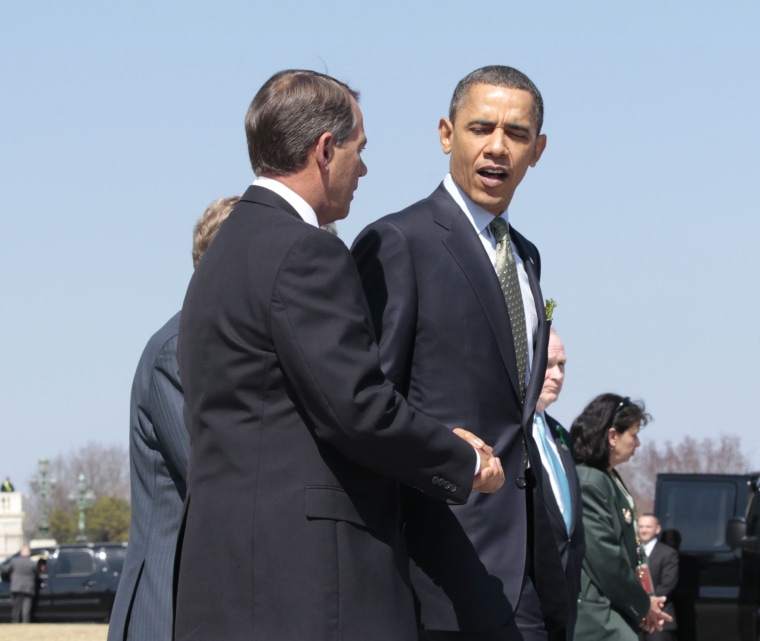John Boehner has been criticizing the President all week for his strategy in Libya or lack thereof.
The Speaker has newly released this official letter to Obama, requesting a clearly defined mission for Operation Odyssey Dawn. Read the whole letter from Boehner:
President Barack ObamaThe White House1600 Pennsylvania Avenue NWWashington, DC 20500Dear Mr. President:Thank you for your letter dated March 21, 2011, outlining your Administration's actions regarding Libya and Operation Odyssey Dawn. The United States has long stood with those who seek freedom from oppression through self-government and an underlying structure of basic human rights. The news yesterday that a U.S. fighter jet involved in this operation crashed is a reminder of the high stakes of any military action abroad and the high price our Nation has paid in blood and treasure to advance the cause of freedom through our history. I respect your authority as Commander-in-Chief and support our troops as they carry out their mission. But I and many other members of the House of Representatives are troubled that U.S. military resources were committed to war without clearly defining for the American people, the Congress, and our troops what the mission in Libya is and what America's role is in achieving that mission. In fact, the limited, sometimes contradictory, case made to the American people by members of your Administration has left some fundamental questions about our engagement unanswered. At the same time, by contrast, it appears your Administration has consulted extensively on these same matters with foreign entities such as the United Nations and the Arab League.It is my hope that you will provide the American people and Congress a clear and robust assessment of the scope, objective, and purpose of our mission in Libya and how it will be achieved. Here are some of the questions I believe must be answered:· A United Nations Security Council resolution does not substitute for a U.S. political and military strategy. You have stated that Libyan leader Muammar Qadhafi must go, consistent with U.S. policy goals. But the U.N. resolution the U.S. helped develop and signed onto makes clear that regime change is not part of this mission. In light of this contradiction, is it an acceptable outcome for Qadhafi to remain in power after the military effort concludes in Libya? If not, how will he be removed from power? Why would the U.S. commit American resources to enforcing a U.N. resolution that is inconsistent with our stated policy goals and national interests? · In announcing that our Armed Forces would lead the preliminary strikes in Libya, you said it was necessary to "enable the enforcement of a no-fly zone that will be led by our international partners." Do we know which partners will be taking the lead? Are there clear lines of authority and responsibility and a chain of command? Operationally, does enforcement of a no-fly zone require U.S. forces to attack non-air or command and control operations for land-based battlefield activities, such as armored vehicles, tanks, and combatants?· You have said that the support of the international community was critical to your decision to strike Libya. But, like many Americans, it appears many of our coalition partners are themselves unclear on the policy goals of this mission. If the coalition dissolves or partners continue to disengage, will the American military take on an increased role? Will we disengage? · Since the stated U.S. policy goal is removing Qadhafi from power, do you have an engagement strategy for the opposition forces? If the strife in Libya becomes a protracted conflict, what are your Administration's objectives for engaging with opposition forces, and what standards must a new regime meet to be recognized by our government?· Your Administration has repeatedly said our engagement in this military action will be a matter of "days, not weeks." After four days of U.S. military action, how soon do you expect to hand control to these other nations? After the transition to coalition forces is completed, how long will American military forces remain engaged in this action? If Qadhafi remains in power, how long will a no-fly zone will be enforced?· We are currently in the process of setting priorities for the coming year in the budget. Has the Department of Defense estimated the total cost, direct and indirect, associated with this mission? While you said yesterday that the cost of this mission could be paid for out of already-appropriated funds, do you anticipate requesting any supplemental funds from Congress to pay for ongoing operations in Libya?· Because of the conflicting messages from the Administration and our coalition partners, there is a lack of clarity over the objectives of this mission, what our national security interests are, and how it fits into our overarching policy for the Middle East. The American people deserve answers to these questions. And all of these concerns point to a fundamental question: what is your benchmark for success in Libya? The American people take the use of military action seriously, as does the House of Representatives. It is regrettable that no opportunity was afforded to consult with Congressional leaders, as was the custom of your predecessors, before your decision as Commander-in-Chief to deploy into combat the men and women of our Armed Forces. Understanding some information required to respond may be classified, I look forward to a complete response. Sincerely, John A. Boehner
